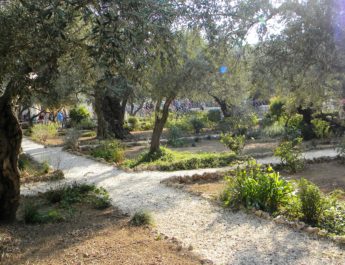1 Corinthians 15:1-11
Easter B
1 Now I want you to understand,A brothersB and sisters, the good newsC
A “understand” = gnorizo. From ginosko (to know, recognize, realize, perceive, learn; gaining knowledge through personal experience). This is to declare, know, discover, make known.
B “brothers” = adelphos. From a (with, community, fellowship) + delphus (womb). This is a brother in a literal or figurative sense. It is also used of another member of the Church.
C “good news” = euaggelion. From eu (well, good, rightly) + aggelos (angel, messenger; a messenger from God bringing news – whether a prophet or an angel); {from aggellos (to bring tidings); probably from ago (to bring, lead, carry, guide)}. This is literally “the good news,” used for the gospel. This is also where “evangelism” comes from.
that I proclaimedD to you, which you in turn received,E in which also you stand,F
D “proclaimed” = euaggelizo. Related to “good news” in v1 & to “good news” in v1. From eu (see note C above) + aggelos (see note C above). This is evangelize – literally to preach the good news. It can be those who hear the news, the news, or a way to say gospel.
E “received” = paralambano. From para (beside, by, in the presence of) + lambano (active acceptance/taking of what is available or what has been offered; emphasizes the choice and action of the individual). This is to receive, take, acknowledge, associate with. It can also mean to take on an office or to learn.
F “stand” = histemi. This is to stand, place, establish, appoint, stand ready, be steadfast.
2 through which also you are being saved,G if you hold firmlyH to the messageI that I proclaimed to you—
G “saved” = sozo. From sos (safe, rescued, well). This is to save, heal, preserve, or rescue. Properly, this is taking someone from danger to safety. It can be delivering or protecting literally or figuratively. This is the root that “savior” and “salvation” come from in Greek.
H “hold firmly” = katecho. 18x in NT. From kata (down, against, according to, throughout) + echo (to have, hold, possess). This is to hold fast, bind, possess, restrain, arrest, suppress. It is to hold down in a literal or figurative sense. It can also be to hold something in one’s memory.
I “message” = logos. From lego (to speak, tell, mention). This is word, statement, speech, analogy. It is a word that carries an idea or expresses a thought, a saying. It could refer to a person with a message or reasoning laid out in words. By implication, this could be a topic, line of reasoning, or a motive. It can be used for a divine utterance or as Word – Christ.
unless you have come to believeJ in vain.K
3 For I handed onL to you as of first importanceM what I in turn had received:
J “believe” = pisteuo. From pistis (faith, faithfulness, belief, trust, confidence; to be persuaded or come to trust); from peitho (to have confidence, urge, be persuaded, agree, assure, believe, have confidence, trust). This is to believe, entrust, have faith it, affirm, have confidence in. This is less to do with a series of beliefs or doctrines that one believes and more to do with faithfulness, loyalty, and fidelity. It is trusting and then acting based on that trust.
K “in vain” = eike. 6x in NT. Probably from eiko (to be weak, submit, yield, give way); probably akin to hekon (freely, voluntary). This is nothing, idly, for no reason.
L “handed on” = paradidomi. From para (from beside, by) + didomi (give, offer, place, bestow, deliver; give in a literal or figurative sense). This is literally to hand over – hence to deliver, abandon, or betray. It implies a personal involvement.
M “first importance” = protos. From pro (before, first, in front of, earlier). This is what is first, which could be the most important, the first in order, the main one, the chief.
that ChristN diedO for our sinsP in accordance with the scripturesQ
N “Christ” = Christos. From chrio (consecrate by anointing with oil; often done for prophets, priests, or kings). Literally, the anointed one, Christ. The Greek word for Messiah.
O “died” = apothnesko. From apo (from, away from) + thnesko (to die, be dead). This is to die off. It is death with an emphasis on the way that death separates. It can also mean to wither or decay.
P “sins” = hamartia. From hamartano (to miss the mark, do wrong, make a mistake, sin); {from a (not) + meros (a part or share)}. Literally, this means not having one’s share or portion – like not receiving inheritance or what was allotted to you. This word means missing the mark so it is used for guilt, fault, and acts of sin.
Q “scriptures” = graphe. From grapho (to write). This is literally writing, a document. In the New Testament, this is always used for scripture.
4 and that he was buriedR and that he was raisedS on the thirdT dayU in accordance with the scriptures
R “buried” = thapto. 11x in NT. This is to bury or hold a funeral.
S “raised” = egeiro. This is to awake, raise up or lift up. It can be to get up from sitting or lying down, to get up from sleeping, to rise from a disease or from death. Figuratively, it can be rising from inactivity or from ruins.
T “third” = tritos. From treis (three). This is third.
U “day” = hemera. Perhaps from hemai (to sit). This is day, time, or daybreak.
5 and that he appearedV to Cephas,W then to the twelve.X 6 Then he appeared to more than five hundredY brothers and sisters at one time,Z
V “appeared” = horao. To see, perceive, attend to, look upon, experience. Properly, to stare at and so implying clear discernment. This, by extension, would indicate attending to what was seen and learned. This is to see, often with a metaphorical sense. Can include inward spiritual seeing.
W “Cephas” = Kephas. 9x in NT. From Aramaic kepha (stone or rock). This is Cephas, the Aramaic translation of Peter’s name.
X “twelve” = dodeka. From duo (two, both) + deka (ten). This is twelve – also shorthand for the apostles.
Y “five hundred” = pentakosioi. 2x in NT. From pente (five) + hekaton (hundred). This is five hundred.
Z “at one time” = ephapax. 5x in NT. From epi (on, upon, what is fitting) + hapax (once, once for all); {from a (with – signifying fellowship) + pag-} or {from hapas (all; every part working together as a unit); from hama (at once, together with) + pas (all, every, every kind of) or from a (with) + pas (all, every)}. This is once for all, at once, one time.
mostAA of whom are still alive,BB though some have died.CC
AA “most” = pleion. From polus (much, many, abundant). This is many, more, great, having a greater value, more excellent.
BB “are still alive” = meno + heos + arti. Meno is to stay, remain, wait, await, continue, abide, endure. It can mean to literally stay in a place or to remain in a condition or to continue with hope and expectation. Arti is perhaps from airo (raise, take up, lift, remove). This is now, the present, from now.
CC “died” = koimao. 18x in NT. From keimai (to lie, recline, set, be appointed, be destined). This is to sleep or put to sleep. Figuratively, it can mean to die. In the New Testament, it is used 15x for death and 3x for sleep.
7 Then he appeared to James,DD then to allEE the apostles.FF
DD “James” = Iakobos. From Hebrew Yaaqob (Jacob); from the same as aqeb (heel, hind part, hoof, rear guard of an army, one who lies in wait, usurper). This is James, meaning heel grabber or usurper.
EE “all” = pas. Related to “at one time” in v6. See note Z above.
FF “apostles” = apostolos. Related to “stand” in v1. From apostello (to send, send away, send forth as a messenger, to commission); {from apo (from, away from) + stello (to set, arrange, prepare, provide for); {probably from histemi (see note F above)}}. This is a messenger – someone sent out on a mission as an envoy or delegate. It can also refer to someone set at liberty. Generally, this is a messenger who is meant to be a representative of the one who sent them. They are thus, set apart on a mission literally or figuratively.
8 LastGG of all, as to one untimely born,HH he appeared also to me. 9 For I amII the leastJJ of the apostles,KK
GG “last” = eschatos. Related to “hold firmly” in v2. Related to eschaton (end, last); perhaps from echo (see note H above). This is last, end, extreme, final. It is often used to discuss the end times, prophecies of the future, and the afterlife. The branch of theology focusing on all these topics is called “eschatology.”
HH “untimely born” = ektroma. 1x in NT. From ek (from, out of) + titrosko (to wound). This word can mean miscarriage or stillbirth. It is one born outside of the expected time – perhaps also a premature birth?
II “am” = eimi. This is to be, exist.
JJ “least” = elachistos. 13x in NT. From elachus (short); used as a superlative for mikros (small). This is smallest or littlest in the sense of size, amount, rank, dignity, and so on.
KK {untranslated} = eimi. Same as “am” in v9. See note II above.
unfitLL to be calledMM an apostle, because I persecutedNN the churchOO of God.PP
LL “unfit” = ou…hikanos. Hikanos is from hikneomai (to reach, come to, attain). This is sufficient, suitable, adequate, competent, ample.
MM “called” = kaleo. Related to keleuo (to command, order, direct); from kelomai (to urge on). This is to call by name, invite, to name, bid, summon, call aloud.
NN “persecuted” = dioko. From dio (put to flight). This is chase or pursue in an aggressive fashion. By implication, it is persecute. It can also be used positively for eagerly pursuing something.
OO “church” = ekklesia. Related to “called” in v9. From ek (from, out from) + kaleo (see note MM above). This is properly a calling out or an assembly. It was used to refer to a church.
PP “God” = Theos. From Proto-Indo-European origins, meaning do, put, place. This is God or a god in general.
10 But by the graceQQ of God I am what I am, and his grace toward me has not beenRR in vain.SS
QQ “grace” = charis. From chairo (to rejoice, be glad; used to say hello; properly, delighting in the grace of God or experiencing God’s favor); from char– (to extend favor, lean towards, be inclined to be favorable towards). This is grace, kindness, favor, gratitude, thanks. It is the sense of being inclined to or favorable towards – leaning towards someone to share some good or benefit. This can be literal, figurative, or spiritual. It is grace as abstract concept, manner, or action.
RR “been” = ginomai. This is to come into being, to happen, become, be born. It can be to emerge from one state or condition to another or is coming into being with the sense of movement or growth.
SS “in vain” = kenos. 18x in NT. Properly, this is something that is empty or void. Hence, it is worthless, foolish, ineffective, morally void, pretentious, unreal, or false.
On the contrary, I workedTT harderUU than anyVV of them, though it was not I but the grace of God that is with me. 11 Whether then it was I or they, so we proclaimWW and so you believed.
TT “worked” = kopiao. From kopos (labor that leads to exhaustion, depletion, weariness, fatigue; working until worn out); from kopto (to cut, strike, cut off; beating the chest to lament and so to mourn). This is working with effort, whether of the body or mind, growing weary, feeling tired, working hard.
UU “harder” = perissos. From peri (all-around, encompassing, excess). This is abundant, more, excessive, advantage, vehemently.
VV “any” = pas. Same as “all” in v7. See note EE above.
WW “proclaim” = kerusso. This is to proclaim, preach, publish. Properly, it is to act as a herald – announcing something publicly with confidence and/or to persuade.
Image credit: “Jesus Appears to the Disciples” by LUMO Project.




